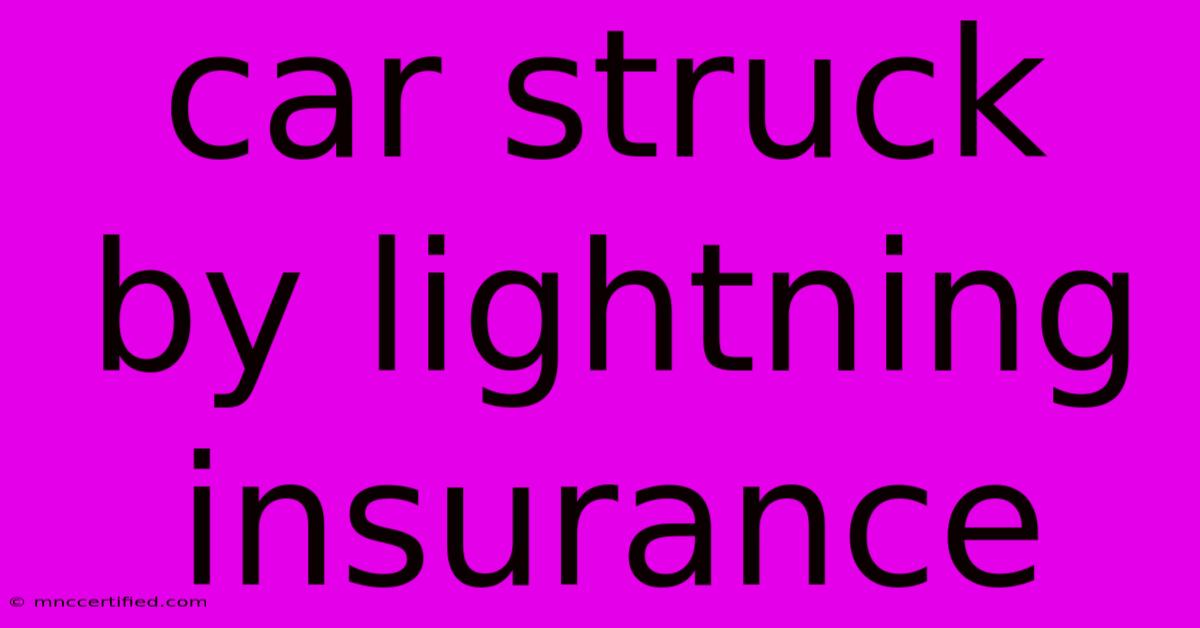Car Struck By Lightning Insurance

Table of Contents
Car Struck by Lightning: Insurance Coverage and Claims Process
Getting your car struck by lightning is a rare event, but it's a significant one. The damage can be extensive, ranging from minor electrical issues to a complete write-off. Understanding your insurance coverage and the claims process is crucial in such a situation. This article will guide you through everything you need to know about car struck by lightning insurance.
Does Car Insurance Cover Lightning Strikes?
Most comprehensive car insurance policies cover damage caused by lightning strikes. This typically falls under the "comprehensive" or "other than collision" section of your policy, which protects against damage from events outside of accidents (like hail, fire, or, yes, lightning). However, it's crucial to check your specific policy wording as coverage can vary between insurers and individual plans. Some policies might have limitations or exclusions, so a careful review is essential.
What Type of Damage is Covered?
Lightning strike damage can include a wide range of issues:
- Electrical system damage: This is a common consequence, affecting components like the computer module, radio, lights, and even the engine.
- Body damage: The intense heat from a lightning strike can melt or warp body panels.
- Internal damage: The powerful electrical surge can fry internal components and electronics.
- Fire: Lightning strikes can sometimes ignite a fire, resulting in extensive damage.
Important Note: While comprehensive insurance generally covers lightning damage, it's less likely to cover pre-existing conditions that were exacerbated by the strike. Therefore, maintaining your car's well-being and having regular maintenance is always crucial.
Filing a Claim After a Lightning Strike
If your car is struck by lightning, follow these steps to file a claim:
- Ensure your safety: Before anything else, prioritize your safety and the safety of others. Do not touch your car until you are certain it is safe.
- Document the damage: Take detailed photos and videos of the damage to your vehicle from multiple angles. Include pictures of the surrounding area to prove the lightning strike occurred. If there are any witnesses, collect their contact information.
- Contact your insurer: Report the incident to your insurance company as soon as possible. Provide them with all the documentation you've gathered. Be prepared to answer their questions accurately and thoroughly.
- Cooperate with the adjuster: Your insurance company will likely send an adjuster to assess the damage. Cooperate fully with their investigation and allow them access to your vehicle.
- Get repair estimates: Once the adjuster has assessed the damage, you can obtain repair estimates from reputable mechanics.
- Review the settlement offer: Once your insurer provides a settlement offer, review it carefully. If you disagree with the amount, negotiate with your insurer or seek legal advice.
Tips for a Smooth Claims Process
- Keep accurate records: Maintain a detailed record of all communication with your insurer, including dates, times, and names of individuals you spoke to.
- Be honest and transparent: Provide accurate information about the incident and the extent of the damage.
- Choose reputable repair shops: Opt for mechanics with a proven track record and good reviews.
- Understand your policy: Thoroughly read and understand your insurance policy before filing a claim.
Preventing Lightning Strike Damage
While you can't entirely prevent a lightning strike, you can take steps to minimize the risk:
- Avoid driving during thunderstorms: This is the most effective way to reduce your risk.
- Park your car in a garage: If a storm hits while you're driving, seek shelter in a sturdy building or garage.
- Unplug electronics: Disconnect any electronic devices from your car's power supply if possible.
Conclusion:
Being struck by lightning is an unforeseen event, but having the right insurance coverage can ease the financial burden of repairs. Remember to carefully review your policy, document the damage thoroughly, and cooperate with your insurance company to ensure a smooth claims process. Being prepared is key to navigating this unusual situation. By understanding your car struck by lightning insurance coverage and following these steps, you'll be well-equipped to handle this unexpected event.

Thank you for visiting our website wich cover about Car Struck By Lightning Insurance. We hope the information provided has been useful to you. Feel free to contact us if you have any questions or need further assistance. See you next time and dont miss to bookmark.
Featured Posts
-
Social Work Malpractice Insurance
Nov 18, 2024
-
Accurate Strom Tracker Forecast And Maps
Nov 18, 2024
-
Wayne Rooney Coleens Distance Claim
Nov 18, 2024
-
Min Sol To Add Lq Raydium Min Sol
Nov 18, 2024
-
I M A Celebs Melvin Odoom Family And Dating
Nov 18, 2024